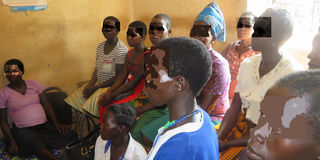School reopening: Teen mothers face bleak future

Child mothers seek antenatal services at Acimi Health Centre II in Oyam District in January 2019. PHOTO/PATRICK EBONG.
What you need to know:
Leaders have asked government to support the victims’ education.
As government debates whether or not to reopen schools, many learners, who gave birth or got married during the lockdown, face a bleak future.
In Lango Sub-region alone, between March 2020 and June 2021, an estimated 15,000 school girls conceived.
However, many are unlikely to return to school due to the adverse impacts of Covid-19 which escalated household poverty.
The sub-region consists of nine districts including Oyam, Kole, Apac, Kwania, Dokolo, Otuke, Alebtong, Amolatar, and Lira.
Esther Akello, 16, a former student of Awelo Secondary School in Amolatar District, conceived during the lockdown.
“I conceived in June last year when I was in Senior Two, but the boy who impregnated me has fled and up to now I don’t know his whereabouts,” Akello said.
The young mother is now employed at a restaurant in Juba market in Lira City.
Akello’s parents live in Abali Village, Amolatar District, and they chased her away from home because she refused to reveal the identity of the man who made her pregnant.
“I am now staying with my aunt in Kakoge Ward. I have no hope of going back to school. Every morning, I carry my baby on my back and I walk to work where I am paid with food and Shs2,000 daily for serving customers and washing plates. This little money I save some potion which helps me to buy essential items for my baby,” she said.
Mr Patrick Gira, the head teacher of Abok Seed Secondary School in Oyam, said when schools reopen, government should counsel both learners and teachers because the Covid-19 bottlenecks have caused mental problems among them.
He said government should allow child mothers to go back to school including those who are still pregnant but warned that this arrangement should only be applicable to the current situation otherwise it could cause high levels of indiscipline among school-going children.
“Even in school they can be kept separately by renting for them accommodation outside the school where they can stay and operate from to avoid stigma from their colleagues,” the head teacher said.
The inspector of schools in Alebtong, Mr Rolex Aloro Ario, said to address the problem, government should immediately reopen schools.
“Experience has shown that when students were in school, the problem of rampant teenage pregnancy was not there,” Mr Aloro said.
He urged all stakeholders to come out and play their roles in sensitising girls and parents on the importance of education because learners are losing interest in it.
“Partners in education must come out boldly to talk to girls and parents on radios. Health departments should come out and talk about the dangers of teenage pregnancy because that is their area of expertise which they have a role to play,” Mr Aloro said.
Mr Dickson Kennedy Odongo, the chairman of all LC5s in Lango, said government needs to urgently come out with a comprehensive programme to address the problem of teenage pregnancy.
He said the problem of teenage pregnancy has become an issue of national importance which Parliament should urgently pronounce itself on and come out with a solution.
“We are having young girls from poor families getting pregnant and producing children, who will grow up in poverty. This is a time bomb in this country,” Mr Odongo said.
He suggested that the government should come out with short tailored courses in vocational skills to train child mothers for at least six months.
Later the learners can be provided with start-up tools so that they can set up their own businesses to support themselves and their children.
For those who are still interested in going back to school, Mr Odongo said there should be no conditions attached, adding that government should meet the full cost of their studies.
He said because of the adverse effects of Covid-19 pandemic many parents in rural areas are too poor and are no longer in position to afford the education of their children.
He added that it is not yet too late for government to address the problem of teenage pregnancy because the budgeting cycle starts in September.
The chairperson of the Lango Parliamentary Group, Ms Judith Alyek, asked government to speed up the vaccination of teachers so that schools can reopen because the longer the schools remain closed, the more the girls will get pregnant.
“The lockdown is affecting our education and letting our girls get pregnant. At home, the more they stay the more they spoil and destroy their future,” Ms Alyek, who is also the Kole Woman MP, said.
ISSUE
Survey
A survey conducted by Plan International Uganda, an NGO, indicates that a total of 8,736 teenage girls in the age bracket of 15 – 19 years were defiled and impregnated in the Lango Sub-region between April and June 2020.
The survey indicates that a total of 1,835 girls aged between 15 and 19 years were impregnated during the first lockdown in Oyam.
Kole had the second highest number of teenage pregnancies with 1,199. This was followed by Lira which had 1,113 girls, including two, who were below 15 years.
In Kwania, 918 girls conceived during the first lockdown. Other districts were not spared either. The number of girls impregnated in Dokolo stood at 896, Alebtong 823, Apac 791, Amolatar 687, and Otuke 474.
Another Sauti za Wananchi survey by Twaweza, an NGO, between October and December 2020 found that across Uganda, 79 percent of citizens say teenage pregnancy has become a bigger problem due to the pandemic.
Some 51 per cent said emotional and sexual violence got worse.




